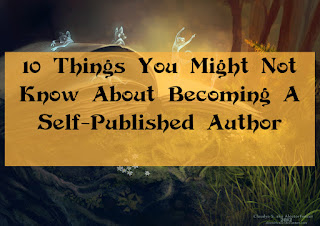5 Reasons to Write Fantasy
 Fantasy is definitely one of those genres that doesn't have a lot of credibility outside of its own sphere. For most of the world around us, they wonder why we waste our time. Fantasy is at turns an escape, demonic, frivolous, immature, nerdy...but most certainly not literary, and not worth any real consideration.
Fantasy is definitely one of those genres that doesn't have a lot of credibility outside of its own sphere. For most of the world around us, they wonder why we waste our time. Fantasy is at turns an escape, demonic, frivolous, immature, nerdy...but most certainly not literary, and not worth any real consideration.For those of us who write it, though, we can't imagine writing anything else. So if you're an "outsider" and looking maybe to come inside, here's 5 reasons to write fantasy -- which, oftentimes, will be enough reason to read it too.
1. You don't have to do research. This was why I started writing it. I had been trying to write military fiction like Tom Clancy, but I was 15 and hated research. I just wanted to write. So I tried writing the stories anyway, hated them because they didn't have the depth of Clancy, and fizzled out after a few chapters if I was lucky to go even that long. Finally, one day, I said: "I need to write something that I don't have to research -- fantasy! You just make it up as you go along!" Now, instead of doing research, I just get to study things I love, pursue questions that actually interest me, and learn about fascinating topics -- most of which serves to give my stories richness and depth.
2. It can include every other genre. This is another point I have to credit to Brandon Sanderson. In his BYU lectures on YouTube, he talks about the fact that fantasy is the only genre that is not limited to its own tropes -- fantasy can also have romance elements, sci fi elements (and vice versa -- Star Wars, much?), mystery, horror, thriller, military -- and yes, even literary (check out Charles Williams if you don't believe me). So whatever genre you like, you can bring it over to fantasy, too.
3. There is an amazing community around it. Remember those nerds I mentioned? Really only a few of them are scary; most of them are awesome, fun, genuine people -- fake people don't find the stardom they seek by being nerdy. It's a commitment. And they take the time to find and appreciate other awesome, fun, genuine people who share a love of the genre.
4. You get to write about dragons. And they're just the tip of the iceberg. For really creative, imaginative people, fantasy is THE place to let that go wild. Anything that you want to stick in there, you can. For a quick idea of some of the possibilities, check out the movie Mirrormask based on the book by Neil Gaiman. This is by no means a treatise on the complete realms of the fantasy genre, but it is bursting at the seams with cool stuff you'll never see anywhere else.
5. You get to write about God. This is an important one to me, as a writer who is Christian. Often it is impossible to talk about God or faith with people -- as soon as they hear it, they turn off or turn to their presuppositions about who God is and what faith and especially Christianity is like. But in fantasy, there's a safe little buffer for the reader to experience deities without them being "real." My intent with my writing, though, is to present the deity and my faith in a way that the reader can experience safely within the book, then return to their daily lives and maybe say, "oh, that actually looks a lot like what real life looks like."
So there you have it. If you think you want to write fantasy but haven't started yet -- START. And do something cool; there's lots of opportunity for it!


Comments
Post a Comment